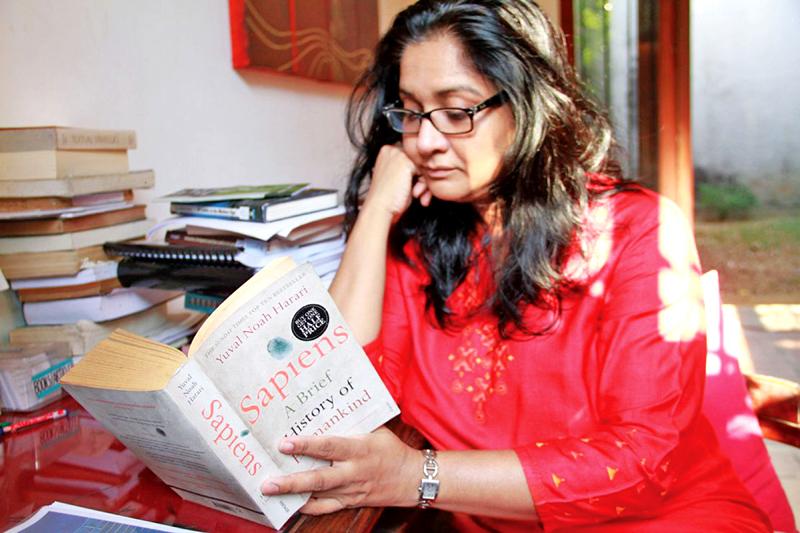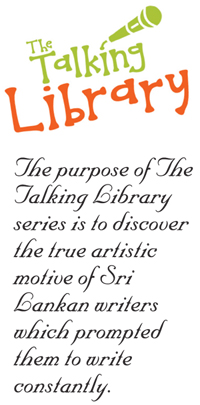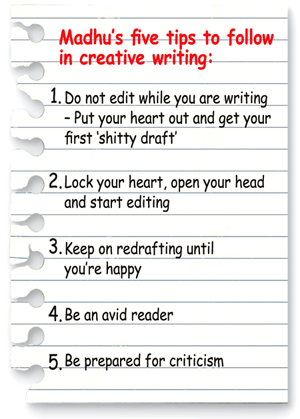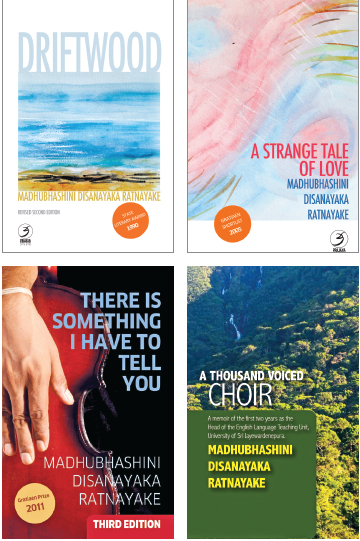
 Madhubhashini Disanayake Rathnayake, is well-known for her creative writing and has won many literary awards during her career as a writer, including the Gratiaen Prize in 2012 for her debut novel There’s Something I Have to Tell You.
Madhubhashini Disanayake Rathnayake, is well-known for her creative writing and has won many literary awards during her career as a writer, including the Gratiaen Prize in 2012 for her debut novel There’s Something I Have to Tell You.
Her first publication Driftwood (1991) won the State Literary Award for the Best Collection of Short Stories in English. Years later, she would follow on that success with two books - Tales of Shades and Shadow (2002) and A Strange Tale of Love (2004), both of which would make the Gratiaen shortlist.
People, who know Madhu, would know that her life is always on the run. A senior lecturer at the University of Sri Jayawardenapura, reading for her PhD on Sri Lankan Post War literature in Sinhala and English at Hitotsubashi University, Japan, Madhu is the mother of two beautiful teenage daughters. Her husband, Pradeep Ratnayake is a veteran musician. She lives amid an extremely demanding schedule in her day to day life. When I raised the question, “How on earth do you find time to write?” she smiled and said, “I may fake and pretend in most of the roles I play in life but writing always makes me feel real and natural. Being a writer is what I always wanted to be.”
Born to intellectual parents, emeritus Prof. J B Disanayake and Kusum Disanayake, and a house full of books, Madhu and her elder brother Samitha Disanayake, knew no other world than that of books.
Peeping into her introverted childhood she recalls that she’s not much of a social creature. Books seem to be her forever companion as she never felt that she’s a loner, buried in her beloved books. “Since I was a child, books were my friends.You don’t feel lonely when you are with your best companion.

Books created a world, perhaps the only thing, apart from music that can be insulated from the meaninglessness in life. Ours was an extremely perfect family but we rarely had conversations. Therefore, sitting in a room and converting all life’s frustrations, dilemmas and questions into a story is always self-healing for me,” said Madhu.
After years of writing short stories, essays and poetry, Madhu spent most of her childhood venting through her writing for college magazines and children’s pages of national newspapers. She says that she considered writing as a medium to refine her thinking, know deeper parts of her-self, connect with others, and share information in easily digestible ways.
“I remember my parents sending my writings to newspapers such as Mihira, the Daily News. It was really encouraging and thrilling to see when one of the short stories or poems get published. It’s sad nowadays that children don’t have a habit of writing and most of them have become slaves to new technology.
Unlike the present with the luxury of expressing everything on Facebook or other social media platforms to become the core of attention in seconds, to get rid of your sufferings easily (although it’s temporary), I’m glad that I was brought up in a generation where writing was one of the best healing methods to express happiness, sorrow, anger, or any other complexities of humanity,” she explained.
Although becoming a writer was a cherished childhood ambition in Madhu’s life, she was reluctant to call herself a writer for years. She wanted to do it the right way and therefore on her 40th birthday she quit her job as Head of the English Language Teaching Unit at the University of Sri Jayawardenapura to take up a Fulbright for a Master’s in Creative Writing at the New York University.

She spent a few years there, completed her Master’s and returned. “It was the wisest decision I ever made. It gave me much confidence in my language skills and although I felt old among other classmates, it wasn’t a disadvantage at all,” Madhu said. Writing is hard, gruelling and difficult work, she said. “However it has been generally misunderstood to be something that only occurs when inspiration strikes in the middle of the night. Thereafter the writer tends to write in a frenzy.
This is not true,” Madhu posits that one’s ability to write correlates with the frequency with which one writes than a natural born talent.
Being an academic in English Language she strongly believes that even bad writers can become good with enough practice. “The only way to practice is to commit yourself to reading and writing consistently,” she said.
She talked about the importance of the opening line of a story, which she calls the ‘hook’ which builds the initial trust between the author and the reader. “I’m a writer who believes that writing is a craft. It’s a whole chaotic, jumble of ideas that you first put on paper and then craft into a novel. When you write you are telling yourself the story. When you rewrite you are taking out all the things that are not the story and at that time you can come up with this golden line – the opening line of the novel. It is the ‘hook’. It will probably be the last to be written, because once you know the ending, you can confidently write this golden opening line,” Madhu explains.
Madhu admits the fact that being a woman and living in a society which is highly dominated by the Sinhala-Buddhist sphere, she has willingly self-censored her expression. “Since we are not living in an ideal world where we can independently express our thoughts and also not be aware of the complexities of society and being oblivious of that in a political sense, is sheer stupidity.
However, she believes that there are many ways an artist can express what she/he wants without being a target, a talent in which true creativity lies.
Madhu said she never thinks about an audience when she writes. “I have never written anything in my life just to pander to the audience. No never. If you think about the audience you will not write, you would be scared.
There are genres where you do formulistic writing and such writing still exists and is doing well in the publishing industry everywhere in the world. Here I’m being a classist and say, those who are into serious literature and those who write for the deeply held reasons can never be worried about their audience as they write to please themselves. The audience could be important for the publisher and not for the writers who are into self-expression,” she said.
The decision to start writing a piece is the most chaotic thing in an amateur-writer’s life.
Madhu said, “you don’t always know what you’re looking for when you start writing, or even what you would find in the middle. You never really know what you’re going for when you start, so there’s nothing to gain from letting your inner perfectionist overrule your desire to write. Your perfectionist can come out when it’s done and it’s time to revise. Until then you have to go on and continue your habit of writing.”
Madhu is often inspired by her surroundings, the unfairness of society and its norms and her debut novel. There’s Something I Have to Tell You which won the Gratiaen Prize in 2012 was based on the uprising of the JVP and the government suppression of the rebel youth.
However, she identified her short stories as very much psychological and the self expressions based on her own imaginations. Madhu strongly believes that imagination has a key role to play in every writer’s life.
She stressed that the present generation lacks imagination as they have not given themselves the chance or time to roam on their own and to be bored. “The present generation is afraid of being bored.
They cannot wait doing nothing. Imagination comes with absolute boredom or having nothing to do. If you want to have a strong imagination, first you have to train yourself to do nothing,”
The time spent with Madhu was like time spent with a spiritual soul. Her three cosmic cat mates, Taro, Tig and Tabby always stood within her sight and even during the interview they never failed to grab her attention silently. “These ones bring so much peace to my soul despite how chaotic day-today life would be,” Madhu concluded.
